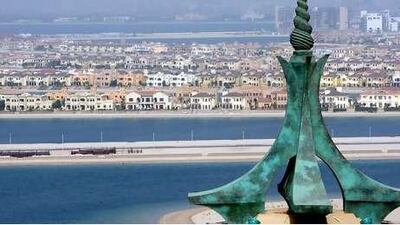In the next two weeks, Dubai World will have a better idea how many of its army of bank creditors have gone for its ambitious plans to restructure US$23.5 billion (Dh86.31bn) of debts that threatened its survival, and the emirate's economic well-being.
On Wednesday, the financial creditors to its property offshoot, the Palm Jumeirah developer Nakheel, meet to consider terms of a multibillion-dollar deal on its debts. Then it's the turn of Dubai World's creditors to consider plans to restructure some $14.4bn of loans at an all-bank meeting in Dubai on July 22. "They've had a long time to digest all this and it would be a surprise if most of them don't eventually go for it. But there have been surprises before in this process, so don't rule it out," says an adviser who asked to remain anonymous. A Dubai World spokesman says nothing will be decided at the meetings, which are being held to present more detailed information on the proposals.
It has been a case of "gently, gently" for Dubai World ever since it first announced the restructuring last November. Back then, the unexpected nature of the announcement, coming after months of assurances from Dubai World that it could meet its financial obligations in full, sent international markets into short-term panic and raised fears about the emirate's overall creditworthiness. Dubai World's advisers have learnt a thing or two from that episode. Creditors have been kept better informed, the process has been more transparent and, crucially, the early agreement of key banks was obtained before any dissident bandwagon could begin to roll.
When the proposals to resolve the debts were unveiled in March, senior members of the seven-strong co-ordinating committee (CoCom) quickly welcomed them in principle, undercutting opposition from more junior creditors. By May, the key CoCom members - Royal Bank of Scotland, Standard Chartered, HSBC, Lloyds, Emirates NBD, Abu Dhabi Commercial Bank and Bank of Tokyo-Mitsubishi UFJ - were ready to give their acceptance to the proposals. As they represented more than 60 per cent of the outstanding liabilities, that was the key moment in the negotiation process that culminates in the meeting next week.
Two men, and the relationship between them, have been crucial to the relatively smooth progress of the proposals so far: Aidan Birkett, the chief restructuring officer of Dubai World, and Bob Hedger, the debt restructuring specialist from RBS, which chairs the Cocom. "They've worked together before on several projects and know each other's mindset. It's been a mutually beneficial arrangement for both sides," says an adviser.
The initial proposals essentially asked creditors to extend the terms of their outstanding liabilities to either five or eight years, and were offered a new annual interest rate of 1 per cent over that period. Most went for the deal as it stood, mindful of the fact that there was no real alternative: Dubai World had already put in place provisions for controlled bankruptcy under a new law, Decree 57 from the Dubai Government, which would have left them with nothing in the case of rejection of Mr Birkett's proposals. The "stick" of Decree 57, alternating with the "carrot" of eventual repayment, was used throughout the negotiations.
There were some reservations from regional banks, which told Mr Birkett bluntly that the return of 1 per cent was not enough; their cost of borrowing in the Gulf, where capital is expensive compared with the rest of the world, made that proposal uneconomic. When final proposals were announced in May, the fears of regional banks were assuaged by a provision that enabled them to elect for a 2 per cent coupon on their debts. It was enough to gain their acceptance of the terms.
Having won over the seven principal bankers, Dubai World has left it to them to persuade the rest of the creditors to accept the deal. With Dubai World debt held by a total of 73 banks (including the seven CoCom members) from around the world, it has been an exhausting process. Each CoCom member has overseen one grouping of smaller creditors to persuade, cajole and encourage into acceptance. One financier likened it to trying to pen sheep in an old-fashioned English sheepdog trial.
With that many banks involved, there are bound to be recusants. In particular, the Europeans among the remaining 66 lenders have seen their own debt problems increase since then and might be less willing to accept Dubai World's terms. But each remaining bank has a relatively small exposure, so it should not affect the outcome. If Dubai World gets the acceptance of banks holding two thirds of the debt, it can use the threat of Decree 57 to frighten the rest into submission, as well as a stack of other tactics used by restructuring experts in these situations, including the threat of cold-shouldering the dissident bank from big deals in the future.
For a major debt restructuring involving so many creditors, the process has gone pretty smoothly so far. If the vast majority gives its approval at the all-bank meeting in Dubai, Mr Birkett hopes to be able to clinch a full deal by October or November. The other part of his strategy - the revival of the Dubai economy through the resuscitation of the emirate's property sector - will take some time longer to achieve.
fkane@thenational.ae

